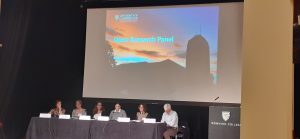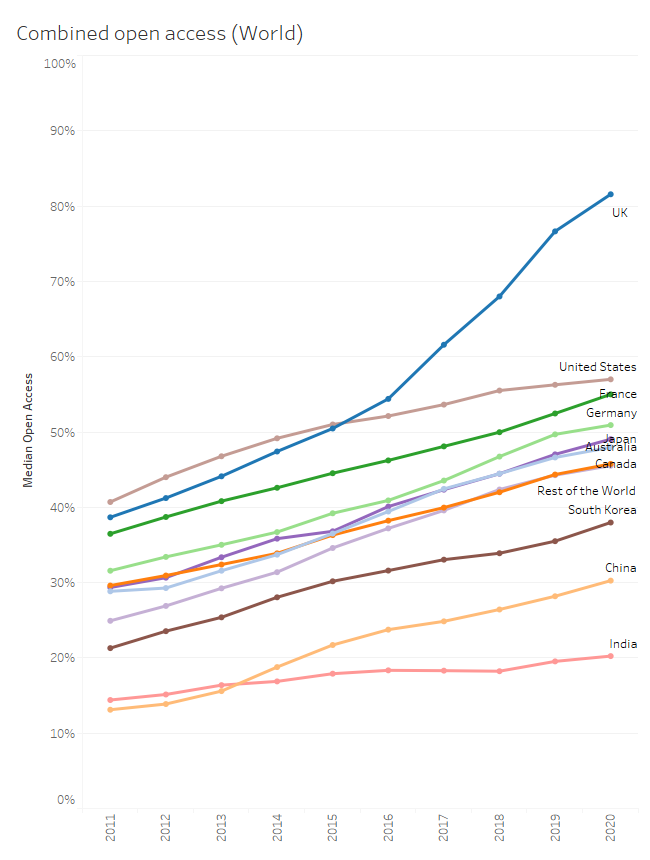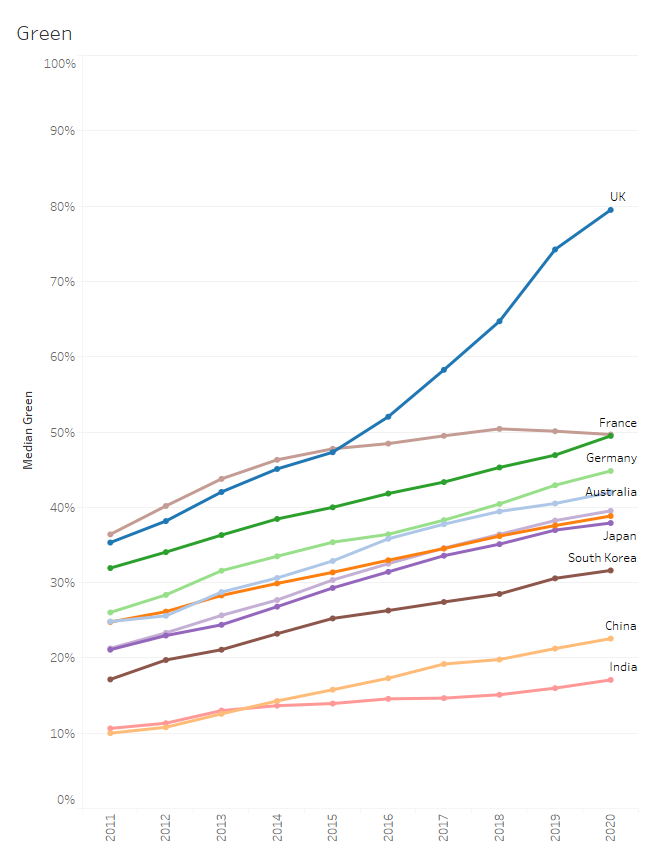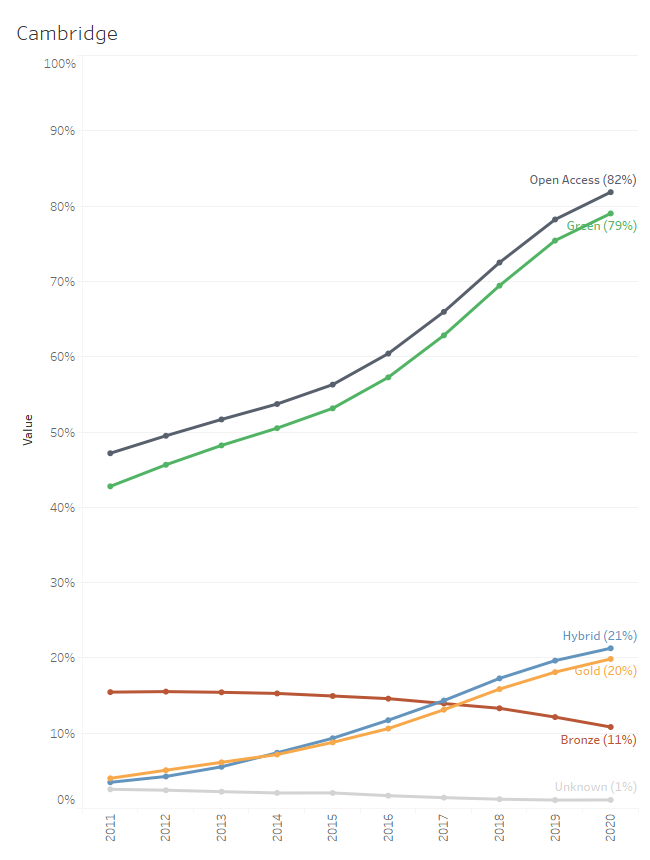Cambridge Data Week 2020 was an event run by the Office of Scholarly Communication at Cambridge University Libraries from 23–27 November 2020. In a series of talks, panel discussions and interactive Q&A sessions, researchers, funders, publishers and other stakeholders explored and debated different approaches to research data management. This blog is part of a series summarising each event:
The rest of the blogs comprising this series are as follows:
Cambridge Data Week day 1 blog
Cambridge Data Week day 2 blog
Cambridge Data Weekday 3 blog
Cambridge Data Week day 4 blog
Introduction
Cambridge Data Week 2020 concluded on 27 November with a discussion between Dr Lauren Cadwallader (PLOS), Professor Stephen Eglen (University of Cambridge) and Kiera McNeice (Cambridge University Press) on models of data peer review. The peer review process around data is still emerging despite the increase in data sharing. This session explored how peer review of data could be approached from both a publishing and a research perspective.
The discussion focused on three main questions and here are a few snippets of what was said. If you’d like to explore the speakers’ answers in full, see the recording and transcript below.
Why is it important to peer review datasets?
Are we in a post-truth world where claims can be made without needing to back them up? What if data could replace articles as the main output of research? What key criteria should peer review adopt?
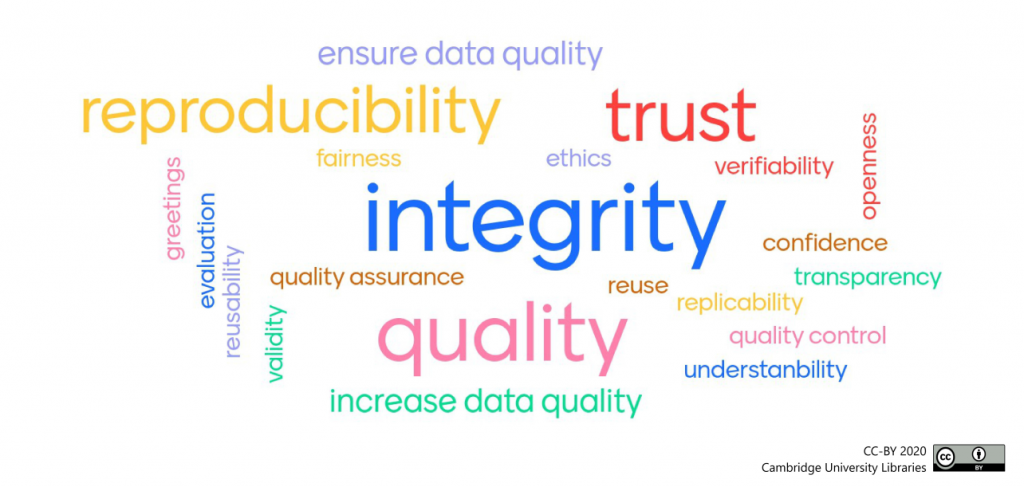
How should data review be done?
Can we drive the spread of Open Data by initially setting an incredibly low bar, encouraging everyone to share data even in its messy state? Are we reviewing to ensure reusability, or do we want to go further and check quality and reproducibility? Is data review a one-off event, or a continuous process involving everyone who reuses the data?
Are journals exclusively responsible for data review, or should authors, repository managers and other organisations be involved? Where will the money come from? What’s in it for researchers who volunteer as data reviewers? How do we introduce the peer review of data in a fair and equitable way?
Who should be doing the work?
Are journals exclusively responsible for data review, or should authors, repository managers and other organisations be involved? Where will the money come from? What’s in it for researchers who volunteer as data reviewers? How do we introduce the peer review of data in a fair and equitable way?
Watch the session
The video recording of the webinar can be found below and the transcript is present in Apollo, the University of Cambridge repository.
Bonus material
After the end of the session, Lauren, Kiera and Stephen continued the discussion, prompted by a question from the audience about whether there should be some form of template or checklist for peer reviewing code. Here is what they said.
Lauren Cadwallader That’s an interesting idea, though of course code is written for different reasons, software, analysis, figures, and so on. Inevitably there will be different ways of reviewing it. Stephen can you tell us more about your experience with CODECHECK?
Stephen Eglen At CODECHECK we have a process to help codecheckers run research code and award a “certificate of executable computation”, like this example of a report. If doing nothing else, then copying whatever files you’ve got onto some repository, dirty and unstructured as that might seem is still gold dust to the next researcher that comes along. Initially we can set the standards low, and from there we can come up with a whole range of more advanced quality checks. One question is ‘what are researchers willing to accept?’ I know of a couple of pilots that tried requiring more work from researchers in preparing and checking their files and code, such as the Code Ocean pilot that Kiera mentioned. I think that we have a community that understand the importance of this and is willing to put in some effort.
Kiera McNeice There’s value in having checklists that are not extremely specialised, but tailored somewhat towards different subject areas. For instance, the American Journal of Political Science has two separate checklists, one for quantitative data and one for qualitative data. Certainly, some of our HSS editors have been saying that some policies developed for quantitative data do not work for their authors.
Lauren Cadwallader It might be easy to start with places where there are communities that are already engaged and have a framework for data sharing, so the peer review system would check that. What do you think?
Kiera McNeice I guess there is a ‘chicken and egg’ issue: does this have to be driven from the top down, from publishers and funders, or does it come from the bottom up, with research communities initiating it? As journals, there is a concern that if we try to enforce very strict standards, then people will take their publications elsewhere. If there is no desire from the community for these changes, publisher enforcement can only go so far.
Stephen Eglen Funders have an important role to play too. If they lead on this, researchers will follow because ultimately researchers are focused on their career. Unless there is recognition that there doing this as a valuable part of one’s work, it will be hard to convince the majority of researchers to spend time on it.
Take a pilot I was involved in with Nature Neuroscience. Originally this was meant to be a mandatory peer review of code after acceptance in principle, but in the end fears about driving away authors meant it was only made optional. Throughout a six-month trial, I was only aware of two papers that went through code review. I can see the barriers for both journal and authors, but if researchers received credit for doing it, this sort of thing will come from the bottom up.
Lauren Cadwallader In our biology-based model review pilot we ran a survey and found that many people opted in because they believe in open science, reproducibility, and so on, but two people opted in because they feared PLOS would think they had something to hide if they didn’t. That’s not at all what it was about. Although I suppose if it gets people sharing data…
Conclusion
We were intrigued by many of the ideas put forward by the speakers, particularly the areas of tension that will need to be resolved. For instance, as we try to move from a world where most data remains in people’s laptops and drawers to a FAIR data world, even sharing simple, messy, unstructured data is ‘gold dust’. Yet ultimately, we want data to be shared with extensive metadata and in an easily accessible form. What should the initial standards be, and how should they be raised over time? And how about the idea of asking Early Career Researchers to take on reviewer roles? Certainly they (and their research communities) would benefit in many ways from such involvement, but will they be able to fit this in their packed schedules?
The audience engaged in lively discussion throughout the session, especially around the use of repositories, the need for training, and disciplinary differences. At the end of the session, they surprised us all with their responses to our poll: “Which peer review model would work best for data?”. The most common response was ‘Incorporate it into the existing review of the article”, an option that had hardly been mentioned in the session. Perhaps we’ll need another webinar exploring this avenue next year!
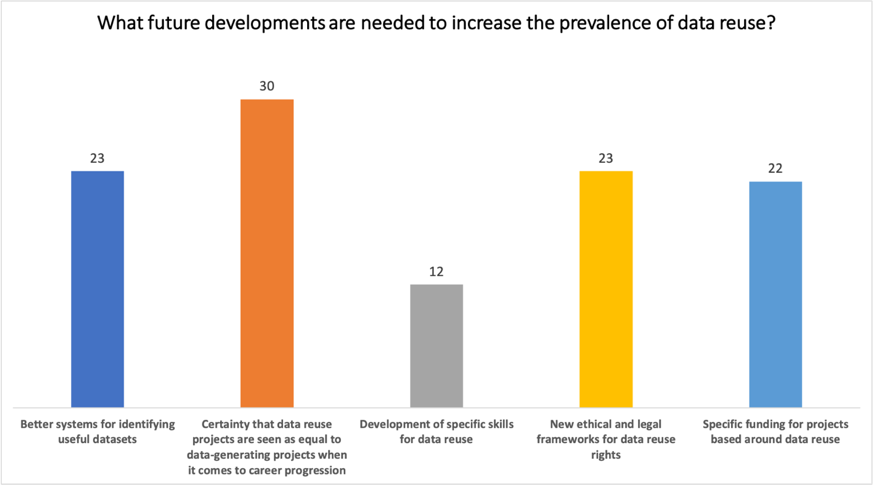
Resources
Alexandra Freeman’s Octopus project aims to change the way we report research. Read the Octopus blog and an interview with Alex to find out more.
Publish your computer code: it is good enough, a column by Nick Barnes in Nature in 2010 arguing that sharing code, whatever the quality, is more helpful than keeping it in a drawer.
The Center for Reproducible Biomedical Modelling has been working with PLOS on a pilot about reviewing models.
PLOS guidelines on peer-reviewing data were produced in collaboration with the Cambridge Data Champions
CODECHECK, led by Stephen Eglen, runs code to offer a “certificate of reproducible computation” to document that core research outputs could be recreated outside of the authors’ lab.
Code Ocean is a platform for computational research that creates web-based capsules to help enable reproducibility.
Editorial on pilot for peer reviewing biology based models in PLOS Computational Biology
Published on 25 January 2021
Written by Beatrice Gini

